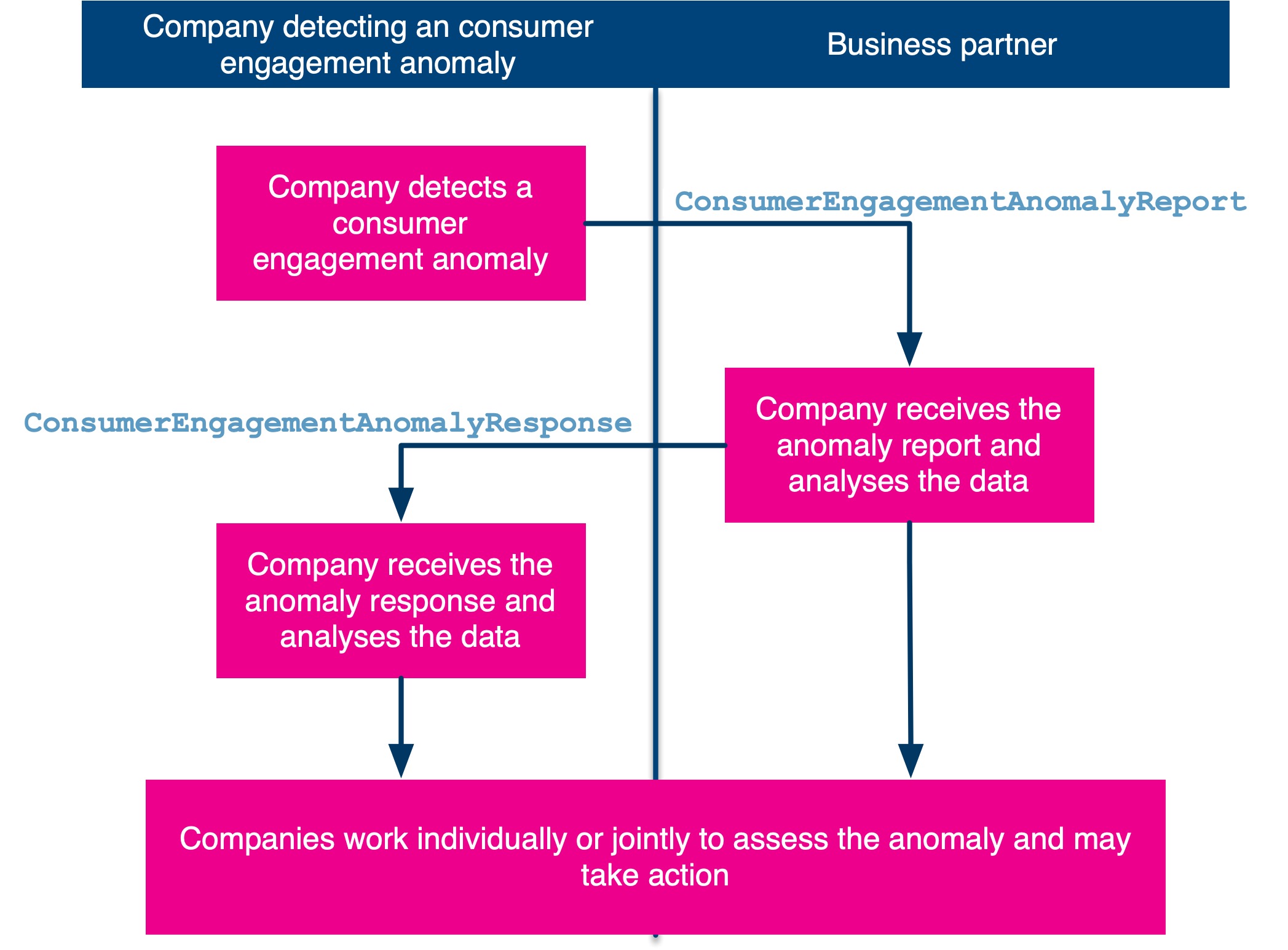5 Scenarios for use of messages
The messages defined in this part of the AR standard may be used to communicate data relating to a number of scenarios:
A DSP detects an apparent anomaly in its system. Their analysis shows the unusual involvement of one or more consumer engagements related to one or more specific writer(s), recording artist(s), work(s), resource(s), release(s), music publisher(s) and/or record company(ies).
A DSP detects an apparent anomaly in its systems. Their analysis shows unusual activity related to a specific consumer’s user account.
A rights controller, when analysing a sales/usage report, detects an apparent anomaly in the sales/usage report data which shows unusual activity by one or more consumer engagements with regard to one or more specific writer(s), recording artist(s), work(s), resource(s), release(s), music publisher(s) and/or record company(ies).
The recipient of an anomaly report created in accordance with this part of the AR standard corroborates (or not) the anomaly by analysing the data contained in the anomaly report and responds by sending the recipient its own data with an anomaly response created in accordance with this part of the AR standard.
The recipient of an anomaly report created in accordance with this part of the AR standard corroborates (or not) the anomaly by analysing the data contained in the anomaly report message and decides to inform one or more of its other business partners (which may include the original sender of the anomaly report, and/or its competitors) of the apparent anomaly by forwarding the data from the received anomaly report, possibly augmented with its own data.
The ConsumerEngagementAnomalyReport and ConsumerEngagementAnomalyResponse may be accompanied by supplemental documents that provide additional information that the sender of the message considers to be helpful to the recipient.
In all of the above scenarios the sender of anomaly data may communicate this using the ConsumerEngagementAnomalyReport as defined in this part of the AR standard. The recipient of the ConsumerEngagementAnomalyReport may carry out its own analysis and communicate the results back to the sender using the ConsumerEngagementAnomalyResponse as defined in this part of the AR standard.
In addition, the recipient of a ConsumerEngagementAnomalyReport may, after carrying out suitable analysis, decide to inform other business partners of the apparent anomaly by using the ConsumerEngagementAnomalyReport.
Neither the sender of a ConsumerEngagementAnomalyReport or a ConsumerEngagementAnomalyResponse, nor its recipient is, by virtue of sending or receiving such messages, obliged to take any specific action whatsoever. Any actions that a sender or recipient of a ConsumerEngagementAnomalyReport or a ConsumerEngagementAnomalyResponse does take is subject to the bilateral agreement between the sender and the recipient of the message and/or any applicable laws or regulations.
Figure 1 sets out the choreography for the communication of data using AR standard messages that support the above scenarios.
Figure 1 — Choreography for reports or responses regarding consumer engagement anomalies
Message name | Initiating event Sender Recipient | ssage name | Initiating event Sender Recipient |
|---|---|---|---|
| A company has detected an apparent anomaly relating to consumer engagements and wishes to inform a business partner about the apparent anomaly to, potentially jointly, take action relating to the anomaly. | Company detecting anomaly | Business partner |
| A company has received a | Company receiving a | Other business partners |
| A company has received a
| Business partner | Company detecting the anomaly |
Table 1 — Messages for reporting of consumer engagements anomalies
The anomaly report, ConsumerEngagementAnomalyReport, and anomaly response, ConsumerEngagementAnomalyResponse, shall be exchanged in accordance with Part 1 of the AR standard on communication protocols.
